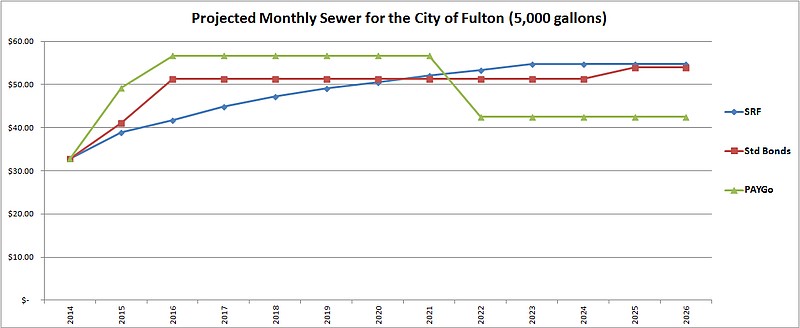Fulton voters can control how their rates will be affected by a number of mandatory upgrades to the city's wastewater treatment facility over the coming years.
Though the city has no contested council seats on the ballot for April 8's municipal elections, a bond issue to pay for the Environmental Protection Agency-mandated effluence upgrades is expected to draw voters to the polls.
Due to increased standards on particles of certain metals, minerals and elements acceptable in effluence - cleaned and treated wastewater that is returned to a natural water source, or Stinson Creek in Fulton's case - the EPA has required Fulton made a number of modifications to the plant, valued at $13 million, by 2016. Fulton has turned to the voters to determine how the project will be funded.
Voters can pass a bond issue that would allow the city to buy bonds or receive funds from the State Revolving Loan program, either of which would reflect a less steep rate increase for utility payers that would last for a longer period of time. If the issue is defeated, the city will use a pay-as-you-go method of funding the project, meaning a steep rate increase that may go down sooner.
The city's website states its current wastewater treatment facility was built in 1987. The EPA has required Fulton to add disinfection, add a new clarifier, modify existing clarifiers, change the waste aeration system, rebuild the augers at the head works and eliminate the use of the retention pond outside of temporarily collecting overflow in a heavy rain event, all to improve the quality of water in Stinson Creek by testing for and reducing zinc, copper, ammonia, phosphorus and nitrogen.
"It became apparent in about 2011 that the current facilities were not going to meet the new requirements," Bill Johnson, director of administration, said. "We went through a phase where the current facility was possibly not even capable of being improved to meet the current requirements, but the city along with Congressman (Blaine) Leutkemeyer spent a lot of time and effort in working with the DNR (state Department of Natural Resources) and EPA to arrive on a mutually agreed-upon set of standards and time line.
"From a city perspective, I believe that that was a very successful and had very positive outcomes."
Johnson said the process of getting the project ready to start was extensive due to the original EPA standards, which Fulton Utilities Superintendent Darrell Dunlap said the original limits were impossible and based on "theoretical" technology. Original estimates would have cost the city $60 million.
Though voters can't opt out of the project, they can choose how it will be paid for - through a bond issue or strictly through a rate increase.

